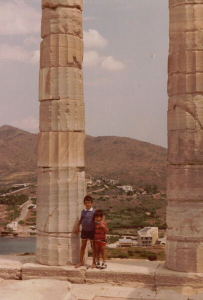Dimitri Nakassis of the Department of Classics at the University of Toronto, has been recognized for his extraordinary originality and future promise with a MacArthur Fellowship.
“Nakassis is a classicist transforming our understanding of prehistoric Greek societies. His rare intellectual breadth, comprising philology, archaeology and contemporary social and economic theory, has equipped Nakassis to challenge the long-held view that Late Bronze Age Mycenaean palatial society (1400–1200 BC) was a highly centralized oligarchy, quite distinct from the democratic city-states of classical Greece. Instead, he proposes that power and resources were more broadly shared,” reads the citation on the MacArthur Foundation website.
Nakassis’ ideas are described in his first book, Individuals and Society in Mycenaean Pylos (2013), and were derived from a meticulous reinterpretation of Pylos’ administrative and accounting records found on clay tablets and written in the early Greek script, Linear B.
The John D. and Catherine T. MacArthur Foundation awards the $650,000 USD grants directly to talented individuals to pursue their creative activities. Recipients are free to use their award to advance their current expertise, engage in bold new work, or, if they wish, to change fields or alter the direction of their careers altogether.
Given Nakassis’ enthusiasm for archaeology and ancient Greece, however, an immediate new career direction seems rather unlikely.

Although he had spent most of his childhood summers visiting archaeological sites in Greece with his family, Nakassis didn’t get seriously interested in archaeology until his first year at university.
Although he had spent most of his childhood summers visiting archaeological sites in Greece with his family, Nakassis didn’t get seriously interested in archaeology until his first year at university, when he signed up for classical archaeology courses with two amazing professors and “was immediately hooked.”
Today, he is co-director of the Western Argolid Regional Project (WARP), an archaeological field survey in southern Greece, where scholars are working to illuminate the nature of human activity in the area.
The team, which includes students from U of T and other universities, is surveying the Inachos river, north and west of the city of Argos. “Essentially it involves walking systematically over the landscape, collecting artifacts from the modern ground surface and documenting what we can’t collect, like standing walls or heavy artifacts like stone agricultural equipment.”
So far, they’ve covered more than 12 square kilometres and identified archaeological sites that date from the Early Bronze Age (so ca. 3000-2000 BC) to the early Modern period (19th century AD) and everything in between, from Classical (480-323 BC) to Medieval.
For Nakassis, intellectual curiosity has proven a trustworthy career guide. “What draws me to survey, I’ve realized lately, is the urge to hike to the top of a hill to see what’s up there — most of the time it’s nothing, but that makes the successes all that more exciting — the urge to turn down a road or path to see where it heads.”
He notes that archaeological surveys and excavations are also full of surprising moments where “you have to rethink what you thought was happening, your old interpretations of the landscape or the site.”
As an example, Nakassis recalls a time last summer when he and a colleague were scouting ahead of the survey teams and came upon a recently-plowed field that was full of material: complete loom-weights and huge fragments of tile. “It was thrilling, and so we called over another survey team in the area to collect the material.
“It was so fun to see everyone hard at work, getting excited about what they were finding.”
The University is thrilled by the Nakassis’ honour. According to Christer Bruun, chair of the Department of Classics at U of T, the awarding of the MacArthur Fellowship to Nakassis “is a recognition of the fact that some of our brightest young scholars continue to be attracted to the study of the humanities and, in Dimitri’s case, in particular classical antiquity.”
“I look forward with great anticipation to the discoveries which the fellowship will allow him to make,” said Bruun.
Nakassis is the first professor at U of T to receive a MacArthur Fellowship and joins an illustrious and diverse group of 2015 fellows that includes journalist Ta-Nehisi Coates, puppetry artist Basil Twist, neuroscientist Beth Stevens and Broadway star Lin-Manuel Miranda. U of T alumnae Sara Seager and Anne Carson were honoured in 2013 and 2000 respectively. Last year, U of T’s Citizen Lab, became the first Canadian organization to win the MacArthur Foundation’s Award for Creative and Effective Institutions, the version of the “genius grants” awarded to organizations.

